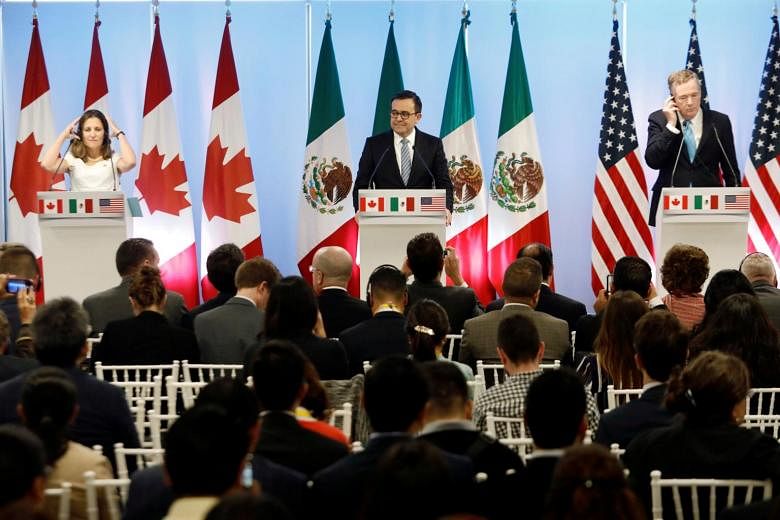MEXICO CITY (REUTERS) - Canada, Mexico and the United States made progress in talks to update the North American Free Trade Agreement (Nafta), top officials said on Tuesday (Sept 5), a relief after repeated criticism by US President Donald Trump, although the round did not delve deeply into the toughest issues.
A joint statement by US Trade Representative Robert Lighthizer, Canadian Foreign Minister Chrystia Freeland and Mexican Economy Minister Ildefonso Guajardo sought to quell concerns about US commitment to the North American Free Trade Agreement after Trump's recent threats he could terminate it.
Lighthizer said no chapter of the pact was completely wrapped up, but advances were made in consolidating language about small businesses, digital trade, the environment and services, among other things.
"We feel like we've done as much as you can hope to do in two rounds," he told reporters at the end of talks in Mexico City. "This is kind of warp speed we are working at."
The ministers announced a third round of talks in Ottawa for Sept 23-27. Guajardo said more complex issues such as Mexican wages, regional content rules and the US trade deficit with Mexico would begin to be addressed in those sessions.
The United States did not make specific proposals on these subjects during the five-day round in Mexico, Guajardo said, looking ahead to a debate in future rounds about how to get a better deal for workers in all three countries.
Nafta, first implemented in 1994, eliminates most tariffs on trade between the United States, Canada and Mexico.
Critics say it has drawn jobs from the United States and Canada to Mexico, where workers are paid far lower wages. The accord's supporters say the loss of manufacturing from the United States has more to do with China than Mexico.
If Nafta collapses, costs could rise for hundreds of billions of dollars in trade as tariffs return, potentially saddling consumers with higher prices and less availability of products ranging from avocados and berries to cars and trucks.
The three ministers restated their goal of reaching a new deal by the end of the year to avoid conflicts with 2018 elections in Mexico and the United States. Moving quickly to consolidate texts is paramount if they are to achieve that goal.
It took five years and more than 20 negotiating rounds to broker the 12-nation Trans-Pacific Partnership (TPP) trade deal that Trump pulled out of right after taking office.
Freeland gave the most upbeat message, praising the working relationship between the three countries, and saying they had established a good foundation for the future rounds of talks.
Despite warm public words, there were signs that Trump's skepticism may have influenced the talks.
An initial draft of the trilateral statement seen by Reuters said the three nations were "fully committed to the negotiation of a new Nafta" and would "join forces in facing the challenges of international competition." Those phrases were excised from the final version.
ENERGY, TELECOMS
Officials involved in meetings said progress was made on telecommunications and energy during the talks.
Energy was partially excluded from the original Nafta because in Mexico it was a state-owned industry However, following a 2013-14 opening to private and foreign investment, Mexico is now ready to incorporate the sector into the deal, with Guajardo saying there was common ground on the issue.
The Mexican minister also signalled readiness for compromise on duty-free limits for e-commerce imports, a point of contention with the United States.
"We have to find a middle point that does not damage our economies with extreme liberalisation," Guajardo said.
One area of concern identified by lobbyists as a possible stumbling block is Lighthizer's aim of incorporating US-specific automotive content requirements.
Another is whether Trump will be prepared to accept the final outcome. Trump used Nafta as a punching bag in his election campaign and has repeatedly threatened to pull out of it, even after modernisation talks began on Aug 16.
Lighthizer said he was confident he could broker a Nafta acceptable to the US president and that his goal was to negotiate a new deal, not pull out.
The US trade representative has adhered to Trump's line that NAFTA must be rewritten to reduce US trade deficits of about US$64 billion (S$87 billion) with Mexico and US$11 billion with Canada and started the talks with strong demands for major changes.
During the closing statements, Lighthizer said Nafta must address the harm done to those in manufacturing industries and benefit all Americans.

